Inside the Mind of President George W. Bush
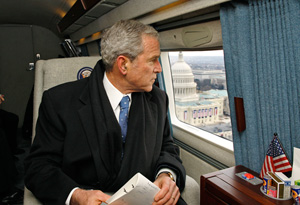
Photo: Getty Images
It's been almost two years since former President George W. Bush walked out of the White House and boarded a helicopter at Andrews Air Force base, closing the chapter on his two terms as America's commander in chief.
"On the helicopter was my dad, who I love, my mom, who I adore, and my wife, who was an awesome first lady," President Bush says. "I was a comfortable guy, and I was ready to go home."
Since that day, the former president has chosen to stay out of the limelight. He has been living quietly in his home state of Texas and working hard on his highly anticipated memoir, Decision Points. "What's so fascinating about this book is that it's like being inside the president's head as he makes his most critical decisions," Oprah says.
"On the helicopter was my dad, who I love, my mom, who I adore, and my wife, who was an awesome first lady," President Bush says. "I was a comfortable guy, and I was ready to go home."
Since that day, the former president has chosen to stay out of the limelight. He has been living quietly in his home state of Texas and working hard on his highly anticipated memoir, Decision Points. "What's so fascinating about this book is that it's like being inside the president's head as he makes his most critical decisions," Oprah says.
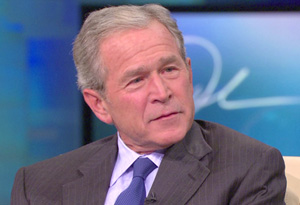
Since his eight years in office came to a close, President Bush has chosen not to speak out about current politics or his successor, President Barack Obama. "When you're famous, people criticize you," he says. "I do believe you ought to treat people the way you want to be treated yourself, and so you're not going to see me out there chirping away. I want our president to succeed."
President Bush is no stranger to criticism—in Decision Points, he recounts the harsh words used to describe him during his presidency. "Partisan opponents and commentators questioned my legitimacy, my intelligence, my sincerity," he writes. "They mocked my appearance, my accent and my religious beliefs. I was labeled a Nazi, a war criminal and Satan himself."
President Bush says he didn't let the critics get to him. "First of all, I read a lot of history when I was president," he says. "My view was if they were criticizing Abraham Lincoln in harsh tones, certainly I could take that."
Watching his father, the 41st President of the United States, in the hot seat was much harder for President Bush. "I love George H.W. Bush; he's an awesome guy," he says. "To watch him go through the '92 campaign, or his presidency being mischaracterized, or people saying ugly things about him really hurt. So when I became president, it was nothing."
When it comes to his own critics, President Bush says their words are more painful to his wife, Laura, his twin daughters, Jenna and Barbara, and his parents than they are to him. "I'm sure it hurt my daughters and my wife, but it didn't hurt me, because I knew what I was doing," he says. "I felt so strongly about some of the decisions I was making, and I felt that history would understand them ultimately. If I had allowed the critics to affect me during the presidency, all this name calling and stuff, I don't think I'd have done my job as a leader."
President Bush is no stranger to criticism—in Decision Points, he recounts the harsh words used to describe him during his presidency. "Partisan opponents and commentators questioned my legitimacy, my intelligence, my sincerity," he writes. "They mocked my appearance, my accent and my religious beliefs. I was labeled a Nazi, a war criminal and Satan himself."
President Bush says he didn't let the critics get to him. "First of all, I read a lot of history when I was president," he says. "My view was if they were criticizing Abraham Lincoln in harsh tones, certainly I could take that."
Watching his father, the 41st President of the United States, in the hot seat was much harder for President Bush. "I love George H.W. Bush; he's an awesome guy," he says. "To watch him go through the '92 campaign, or his presidency being mischaracterized, or people saying ugly things about him really hurt. So when I became president, it was nothing."
When it comes to his own critics, President Bush says their words are more painful to his wife, Laura, his twin daughters, Jenna and Barbara, and his parents than they are to him. "I'm sure it hurt my daughters and my wife, but it didn't hurt me, because I knew what I was doing," he says. "I felt so strongly about some of the decisions I was making, and I felt that history would understand them ultimately. If I had allowed the critics to affect me during the presidency, all this name calling and stuff, I don't think I'd have done my job as a leader."
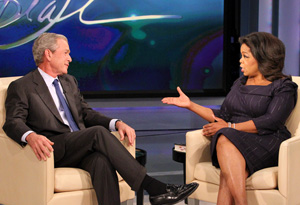
Photo: George Burns/Harpo Studios
President Bush says he titled his memoir Decision Points because it outlines the critical personal and political decisions he made that defined his eight years in the White House.
The first point he writes about is his decision to quit drinking. After getting, as he says, "drunk as a skunk" on his 40th birthday, President Bush says he stopped drinking the very next day.
"I realized I was falling in love with alcohol," he says. "Alcohol was crowding out my affections for my wife and my daughters."
President Bush describes the kind of person he became when he drank and recalls a dinner party he attended with his family years ago.
President Bush: I'm like my mother; I've got kind of a quick tongue. And if you drank too much, the tongue got a little loose. So I'm sitting next to a lovely 50-year-old woman at a dinner table in Maine, and I'd had too much to drink and I said, "What's sex like after 50?"
Oprah: Which you never would have said had you been sober.
President Bush: No, I wouldn't. The problem was my mother and my wife and my father weren't really happy with me saying that. And I tell the story because alcohol, at times, made me a fool.
Were it not for his decision to quit drinking, President Bush says there wouldn't have been a presidency. "No, I wouldn't be sitting here," he says.
As for the woman at the dinner party, she got the last laugh. "The end of the story is this," President Bush says. "When I was governor of Texas, I turned 50 and I got a note from the lady that said, 'Well, what's the answer?'"
The first point he writes about is his decision to quit drinking. After getting, as he says, "drunk as a skunk" on his 40th birthday, President Bush says he stopped drinking the very next day.
"I realized I was falling in love with alcohol," he says. "Alcohol was crowding out my affections for my wife and my daughters."
President Bush describes the kind of person he became when he drank and recalls a dinner party he attended with his family years ago.
President Bush: I'm like my mother; I've got kind of a quick tongue. And if you drank too much, the tongue got a little loose. So I'm sitting next to a lovely 50-year-old woman at a dinner table in Maine, and I'd had too much to drink and I said, "What's sex like after 50?"
Oprah: Which you never would have said had you been sober.
President Bush: No, I wouldn't. The problem was my mother and my wife and my father weren't really happy with me saying that. And I tell the story because alcohol, at times, made me a fool.
Were it not for his decision to quit drinking, President Bush says there wouldn't have been a presidency. "No, I wouldn't be sitting here," he says.
As for the woman at the dinner party, she got the last laugh. "The end of the story is this," President Bush says. "When I was governor of Texas, I turned 50 and I got a note from the lady that said, 'Well, what's the answer?'"
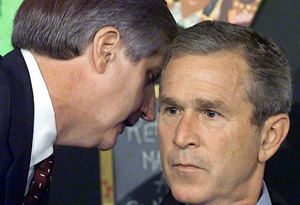
Photo: Getty Images
One of the biggest decisions President Bush had to make in his career happened in the early morning hours of September 11, 2001. As he sat before a classroom of second-graders in Sarasota, Florida, no one knew America was under attack. Four planes had been hijacked by terrorists, and the world was about to change forever.
President Bush writes about that tragic day in his memoir. "I sensed a presence behind me. Chief of Staff Andy Card pressed his head next to mine and whispered in my ear. 'A second plane hit the second tower. America is under attack.'"
Watch President Bush talk about his reaction.
President Bush says he was initially angry. "[I thought], 'How dare they attack us,'" he says. "Then I looked at the little kids. The innocence of the children in the classroom in contrast to the evil of those who would attack America was vivid. It became very clear to me that my job was to protect the people."
With reporters and cameras lined along the back wall of the classroom, President Bush knew his reaction would be broadcast around the world. For seven minutes, he did not move from his chair.
"I'd had enough experience as a chief executive of a state to know during a crisis that the leader must project calm," he says. "My advice to somebody who is head of an organization during a crisis is to understand that. I decided to wait for an appropriate moment, and got up and calmly left."
President Bush writes about that tragic day in his memoir. "I sensed a presence behind me. Chief of Staff Andy Card pressed his head next to mine and whispered in my ear. 'A second plane hit the second tower. America is under attack.'"
Watch President Bush talk about his reaction.
President Bush says he was initially angry. "[I thought], 'How dare they attack us,'" he says. "Then I looked at the little kids. The innocence of the children in the classroom in contrast to the evil of those who would attack America was vivid. It became very clear to me that my job was to protect the people."
With reporters and cameras lined along the back wall of the classroom, President Bush knew his reaction would be broadcast around the world. For seven minutes, he did not move from his chair.
"I'd had enough experience as a chief executive of a state to know during a crisis that the leader must project calm," he says. "My advice to somebody who is head of an organization during a crisis is to understand that. I decided to wait for an appropriate moment, and got up and calmly left."
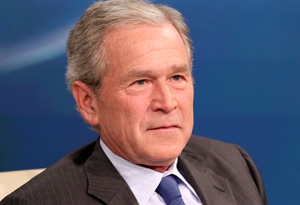
Photo: George Burns/Harpo Studios
After addressing the nation from that Sarasota elementary school, President Bush says he was heading back to Air Force One to fly to Washington, D.C., when he learned a third plane had crashed into the Pentagon.
"My construct was this," President Bush says. "The first one was likely an accident, the second one was an attack, and the third one was a declaration of war. [I thought], 'I'm the commander in chief, and I want to be in Washington, D.C.'"
President Bush was advised by former Secretary of State Condoleezza Rice to stay away from the White House because it wasn't safe. Despite these warnings, President Bush says he knew he had to fly home.
"There was a lot of uncertainty in Washington still about whether or not there were other planes getting ready to attack," he says. "But I was not going to give a speech to the nation from a bunker in Omaha, Nebraska. I would not give the enemy the satisfaction of seeing the president of the United States holed up underground, so [I said], 'I'm coming home.'"
That evening, as he flew over the Pentagon, President Bush says he believed he was looking at an act of war. "I was thinking, 'What do we have to do to protect the United States of America?' I was thinking war," he says. "I thought 'war' for seven and a half years as president, sadly."
"My construct was this," President Bush says. "The first one was likely an accident, the second one was an attack, and the third one was a declaration of war. [I thought], 'I'm the commander in chief, and I want to be in Washington, D.C.'"
President Bush was advised by former Secretary of State Condoleezza Rice to stay away from the White House because it wasn't safe. Despite these warnings, President Bush says he knew he had to fly home.
"There was a lot of uncertainty in Washington still about whether or not there were other planes getting ready to attack," he says. "But I was not going to give a speech to the nation from a bunker in Omaha, Nebraska. I would not give the enemy the satisfaction of seeing the president of the United States holed up underground, so [I said], 'I'm coming home.'"
That evening, as he flew over the Pentagon, President Bush says he believed he was looking at an act of war. "I was thinking, 'What do we have to do to protect the United States of America?' I was thinking war," he says. "I thought 'war' for seven and a half years as president, sadly."
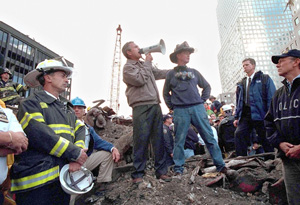
Photo: Getty Images
On the morning of September 12, President Bush woke up to a changed country and new priorities. "My mission was to protect the people," he says. "We had to find out who the enemy was, what the enemy was thinking, what the plans of the enemy were."
Although threats were pouring in, President Bush says he was never feared for his safety. "I'm pretty fatalistic about it in the sense that, if it's time to go, it's time to go. And I'll be ready," he says. "I was afraid for the country."
President Bush says walking into Ground Zero was like walking into hell. "There was water and dust and soot," he says. "I got in there with the firefighters and first responders and police, and there's a palpable feeling of anger and revenge and raw emotion. I did the best I could do to comfort to them and tell them how proud we were of them. It was a very emotional moment."
Although threats were pouring in, President Bush says he was never feared for his safety. "I'm pretty fatalistic about it in the sense that, if it's time to go, it's time to go. And I'll be ready," he says. "I was afraid for the country."
President Bush says walking into Ground Zero was like walking into hell. "There was water and dust and soot," he says. "I got in there with the firefighters and first responders and police, and there's a palpable feeling of anger and revenge and raw emotion. I did the best I could do to comfort to them and tell them how proud we were of them. It was a very emotional moment."

In the wake of 9/11, President Bush declared a "War on Terror." Troops invaded Afghanistan and the hunt for al-Qaeda's leader, Osama bin Laden, began.
Under President Bush's orders, U.S. troops also invaded Iraq on March 20, 2003, signaling the start of the Iraq War. Their mission was to remove Saddam Hussein, the nation's ruthless dictator, from power and disarm Iraq of weapons of mass destruction—but none were found. "When we didn't find weapons, I felt terrible about it, and sick about it and still do because a lot of the case in removing Saddam Hussein was based upon weapons of mass destruction," he says.
At the time, President Bush says his intelligence service was certain that Hussein was harboring these weapons. "Many people who became critics of the war later on felt he had weapons of mass destruction," he says. "We had to view Saddam Hussein differently after 9/11. When you saw a threat, you could not let it fully materialize—and the threat that he represented as a sworn enemy of the United States was to give weapons of mass destruction to an enemy that had just attacked us."
Under President Bush's orders, U.S. troops also invaded Iraq on March 20, 2003, signaling the start of the Iraq War. Their mission was to remove Saddam Hussein, the nation's ruthless dictator, from power and disarm Iraq of weapons of mass destruction—but none were found. "When we didn't find weapons, I felt terrible about it, and sick about it and still do because a lot of the case in removing Saddam Hussein was based upon weapons of mass destruction," he says.
At the time, President Bush says his intelligence service was certain that Hussein was harboring these weapons. "Many people who became critics of the war later on felt he had weapons of mass destruction," he says. "We had to view Saddam Hussein differently after 9/11. When you saw a threat, you could not let it fully materialize—and the threat that he represented as a sworn enemy of the United States was to give weapons of mass destruction to an enemy that had just attacked us."
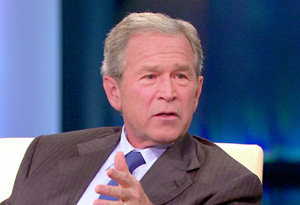
Although weapons of mass destruction were never found, President Bush says inspectors reported that Hussein was still very dangerous. "We may not have found the vials, but he had the capacity to make weapons," he says. "The point I make is that Saddam Hussein in power today would mean the world would be less stable and more dangerous, and 25 million Iraqis would be living under the thumb of a brutal, ruthless dictator. My point is the world's better with him gone."
In 2007, President Bush made another controversial decision and ordered the deployment of more than 20,000 additional troops to Iraq. Since the war began, 4,421 U.S. soldiers have lost their lives—a fact the former commander in chief says weighs on him.
"It weighs heavily because I know that the decision I made disrupted somebody's life in a big way," he says. "It would weigh more heavily on me, however, if I had cared more about my political standing and less about completing the mission."
In 2007, President Bush made another controversial decision and ordered the deployment of more than 20,000 additional troops to Iraq. Since the war began, 4,421 U.S. soldiers have lost their lives—a fact the former commander in chief says weighs on him.
"It weighs heavily because I know that the decision I made disrupted somebody's life in a big way," he says. "It would weigh more heavily on me, however, if I had cared more about my political standing and less about completing the mission."
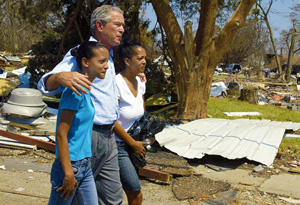
Photo: Getty Images
Another defining moment in President Bush's second term occurred on August 29, 2005. On this day, Hurricane Katrina, one of the deadliest storms in American history, hit the Gulf Coast. This natural disaster claimed the lives of at least 1,836 people, and property damage totaled more than $80 billion.
"It looked like a nuclear bomb had hit the coast," President Bush says.
In the days that followed Katrina's landfall, President Bush was criticized for slow relief response. But what many people don't know, he says, is that a state's governor—not the president—is in charge of emergency response. "The federal government's role is to help the governor," he says.
Five days after strong winds and floodwaters turned lives upside down, President Bush met with then Louisiana Gov. Kathleen Blanco and New Orleans Mayor Ray Nagin. He says tension was high. "Everybody's blaming everybody else so I said to the governor, 'Governor, give me the authority to send in federal troops,'" President Bush says. "By law, the president cannot send federal troops to conduct law enforcement without a declaration of insurrection and/or a request from the governor."
In his memoir, President Bush writes that Gov. Blanco requested 24 more hours to make her decision. "I'm not attempting to blame only the governor," he says. "We all could have done a better job."
Although he was unable to send in troops without the governor's permission, he says he could have sent in unarmed military personnel. "The problem was, I was listening to all the reports, many of which turned out not to be true—interestingly enough—that there was rape, murder and gunfire," he says. "I wasn't going to put a troop in harm's way without the capacity to defend him or herself. If I had to do it over again, knowing what I know today, I'd have sent them in with no weapons."
"It looked like a nuclear bomb had hit the coast," President Bush says.
In the days that followed Katrina's landfall, President Bush was criticized for slow relief response. But what many people don't know, he says, is that a state's governor—not the president—is in charge of emergency response. "The federal government's role is to help the governor," he says.
Five days after strong winds and floodwaters turned lives upside down, President Bush met with then Louisiana Gov. Kathleen Blanco and New Orleans Mayor Ray Nagin. He says tension was high. "Everybody's blaming everybody else so I said to the governor, 'Governor, give me the authority to send in federal troops,'" President Bush says. "By law, the president cannot send federal troops to conduct law enforcement without a declaration of insurrection and/or a request from the governor."
In his memoir, President Bush writes that Gov. Blanco requested 24 more hours to make her decision. "I'm not attempting to blame only the governor," he says. "We all could have done a better job."
Although he was unable to send in troops without the governor's permission, he says he could have sent in unarmed military personnel. "The problem was, I was listening to all the reports, many of which turned out not to be true—interestingly enough—that there was rape, murder and gunfire," he says. "I wasn't going to put a troop in harm's way without the capacity to defend him or herself. If I had to do it over again, knowing what I know today, I'd have sent them in with no weapons."
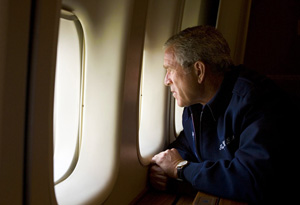
Photo: Getty Images
On Day 3 of Hurricane Katrina's aftermath, President Bush flew over the devastation on his way to Washington, which he now says was a mistake. "I shouldn't have flown over and looked," he says. "I should have landed. The problem is that when the president lands, resources are taken off the task at hand to protect the president, and I was worried about landing and then being criticized for [taking resources] away from the recovery."
A photo of the president looking down on the damage from Air Force One made headlines. "The truth of the matter is, I didn't realize a picture of me looking out would look like I didn't give a darn, because I did care a lot," he says. "I cared about the suffering."
A live telethon for Hurricane Katrina victims—many of whom were poor, African-American residents—was broadcast just days later. Rap artist Kanye West went on camera and said, "George Bush doesn't care about black people." Civil rights leader Jesse Jackson later compared the New Orleans Convention Center to the hull of a slave ship, and a member of the Congressional Black Caucus claimed that if the storm victims had been white, middle-class Americans, they would have received more help.
Although he usually didn't let his critics affect him, President Bush says these comments hurt. "You can disagree with my politics, but don't ever accuse me of being a racist," he says. "I put policy in place that I really felt helped people from all races in America. I don't understand why somebody would accuse me of being a racist. There's no justification for that whatsoever. Frankly, it speaks to the ugliness of the American political scene."
Watch President Bush discuss accusations of racism.
President Bush says he feels as strongly about these accusations today as he did five years ago.
"I can see how the perception could be, maybe, 'Bush didn't care,'" he says. "But to accuse me of being a racist is disgusting. ... It's one thing to say: 'He could have done a better job. He maybe should have put troops in.' You don't call a man a racist when I'm confident my heart is right on that issue."
A photo of the president looking down on the damage from Air Force One made headlines. "The truth of the matter is, I didn't realize a picture of me looking out would look like I didn't give a darn, because I did care a lot," he says. "I cared about the suffering."
A live telethon for Hurricane Katrina victims—many of whom were poor, African-American residents—was broadcast just days later. Rap artist Kanye West went on camera and said, "George Bush doesn't care about black people." Civil rights leader Jesse Jackson later compared the New Orleans Convention Center to the hull of a slave ship, and a member of the Congressional Black Caucus claimed that if the storm victims had been white, middle-class Americans, they would have received more help.
Although he usually didn't let his critics affect him, President Bush says these comments hurt. "You can disagree with my politics, but don't ever accuse me of being a racist," he says. "I put policy in place that I really felt helped people from all races in America. I don't understand why somebody would accuse me of being a racist. There's no justification for that whatsoever. Frankly, it speaks to the ugliness of the American political scene."
Watch President Bush discuss accusations of racism.
President Bush says he feels as strongly about these accusations today as he did five years ago.
"I can see how the perception could be, maybe, 'Bush didn't care,'" he says. "But to accuse me of being a racist is disgusting. ... It's one thing to say: 'He could have done a better job. He maybe should have put troops in.' You don't call a man a racist when I'm confident my heart is right on that issue."
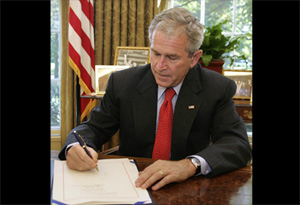
Photo: Getty Images
Just months before his second term ended, President Bush had another important decision to make. The economic downturn hit, and while he says he'd noticed problems with some financial institutions, President Bush says he felt blindsided.
"Fannie Mae and Freddie Mac had an implicit government guarantee and were beginning to write a lot of risky mortgages and make a lot of risky investments," he says. "I saw that coming and asked Congress to reform it, which they would not do. ... But, no, we didn't see the complete financial meltdown."
President Bush says he was advised to do something drastic or else the country would head toward a depression. In 2008, he signed the Emergency Economic Stabilization Act, a $700 billion bailout of the financial services industry.
"I didn't want to be a president overseeing a depression," he says. "I didn't want to see our people hurt, and yet the solution was to take your money and give it to Wall Street. The people who, I thought, in some measure, caused the meltdown in the first place."
President Bush says this was a tough call, but he believes it was necessary. "I can't prove it to you. All I can tell you is we didn't have a depression," he says. "I believe it helped save the country. I really do."
"Fannie Mae and Freddie Mac had an implicit government guarantee and were beginning to write a lot of risky mortgages and make a lot of risky investments," he says. "I saw that coming and asked Congress to reform it, which they would not do. ... But, no, we didn't see the complete financial meltdown."
President Bush says he was advised to do something drastic or else the country would head toward a depression. In 2008, he signed the Emergency Economic Stabilization Act, a $700 billion bailout of the financial services industry.
"I didn't want to be a president overseeing a depression," he says. "I didn't want to see our people hurt, and yet the solution was to take your money and give it to Wall Street. The people who, I thought, in some measure, caused the meltdown in the first place."
President Bush says this was a tough call, but he believes it was necessary. "I can't prove it to you. All I can tell you is we didn't have a depression," he says. "I believe it helped save the country. I really do."
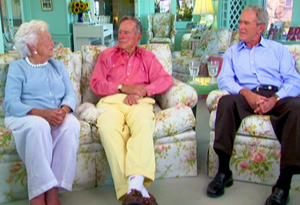
Though his politics have defined his career, President Bush says it's his family that makes him who he is. "My family meant the world to me, and during the presidency, Laura, the girls, my family—my brothers and sisters and mother and dad—provided such great stability and love, and they're a constant in my life," he says. "I'm a blessed person because of that."
Watch President Bush and his parents sit down for a historic interview at their summer home.
President Bush, who's affectionately referred to as "43" in his family, has an especially close relationship with his father, known as "41." These accomplished men are only the second father-son duo in history to be elected president. "I'm fortunate to have a mother and father who provided great stability and great love," President Bush says.
Growing up, President Bush says he occasionally tested his parents' love, as any child would. "I wrecked two cars at 14. I poisoned [my sister] Dorothy's goldfish by pouring vodka in the fish bowl. My mother still loved me," he jokes. "Dorothy didn't love me, nor the goldfish!"
Watch President Bush and his parents sit down for a historic interview at their summer home.
President Bush, who's affectionately referred to as "43" in his family, has an especially close relationship with his father, known as "41." These accomplished men are only the second father-son duo in history to be elected president. "I'm fortunate to have a mother and father who provided great stability and great love," President Bush says.
Growing up, President Bush says he occasionally tested his parents' love, as any child would. "I wrecked two cars at 14. I poisoned [my sister] Dorothy's goldfish by pouring vodka in the fish bowl. My mother still loved me," he jokes. "Dorothy didn't love me, nor the goldfish!"
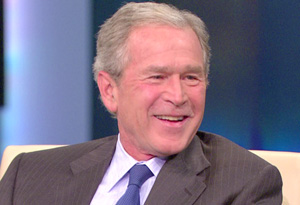
President Bush says he hopes his memoir gives readers a better understanding of who he is and the decisions he made.
"When it was over, I knew I'd given my heart and soul, I'd poured everything I had into the job and was grateful for the opportunity to serve," he says.
President Bush says the writing process was easy, even fun. "I know full well it's going to come as a shock to some people. A lot of people didn't think I could read, much less write," he jokes.
"When it was over, I knew I'd given my heart and soul, I'd poured everything I had into the job and was grateful for the opportunity to serve," he says.
President Bush says the writing process was easy, even fun. "I know full well it's going to come as a shock to some people. A lot of people didn't think I could read, much less write," he jokes.



